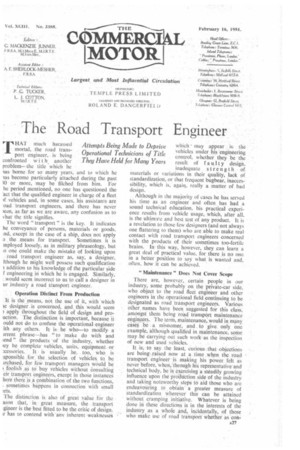The Road Transport Engineer
Page 29

Page 30

If you've noticed an error in this article please click here to report it so we can fix it.
mortal, the road trans THAT much harassed Attempts Being Made to Deprive mortal, the road trans Operational Technicians of Title confronted w i t h. another They Have Held for Many Years prciblem,-the title which he as borne for so many years, and to which he las become particularly attached during the past 10 or more, may be filched from him. For he period Mentioned, no one has questioned the act that the qualified engineer in charge of a fleet )f vehicle's and, in some cases, his assistants are oad 'transport engineers, and there has never men, as far as we are aware, any confusion as to vhat the title signifies.
The word " transport " is the key. It indicates he conveyance of persons, materials or goods, Ad, except in the case of a ship, does not apply o .the means for transport. Sometimes it is mployed loosely, as in military phraseology, but o one could make the mistake of looking upon road transport engineer as, say, a designer, lthough he might well possess such qualification addition to his knowledge of the particular side I engineering in which he is engaged. Similarly, . mould seem incorrect to us to call a designer in ur industry a road transport engineer.
Operation Distinct From Production It is the means, not the use of it, with which m designer is concerned, and this would seem apply throughout the field of design and prouction. The distinction is important, because it ould not do to confuse the operational engineer ith any. others. It is-: he who—to modifya merit phrase—has " to -make do with and tend" the products of • the industry, whether my be complete vehicles, units, equipment or =stories. It • is usually he, too, who is tsponsikle for the selection of vehicles, to, be Hchased, for feW transport managers would be foolish as to buy vehicles without'Consulting eir transport engineers, except in thote instance here there is a combination of the two functions, sometimes happens in connection with small :ets.
The distinction is also of great value for the ason that, in. great measure, the transport .gineer is the best fitted.to be the critic of design: e has to contend with -any inherent-weaknesses whiclr may appear in the vehicles under his engineering control, whether they be the result of f atilt y design, inadequate strength of materials or variations in their quality, lack. of standardization, or that frequent bugbear, inacces sibility, which is, again, really a matter of bad design.
Although in the majority of cases he has served his time as an engineer and often has had a sound technical education, his practical experience results from vehicle usage, which, after all, is the ultimate and best test of any product. It is a revelation to those few designers (and not always one flattering to them) who are able to make real contact with road transport engineers concerned with the products of their sometimes too-fertile brains. -Inthis way, however, they can learn_ a great deal of practical value, for there is no one. in a better position to say what it wanted and, often, how it can be achieved.
Maintenance" Does Not Cover Scope There are, however, certain people in our industry, some probably on the private-car side, who object to the road fleet engineer and other engineers in the operational field continuing to be designated as road. transport engineers Various other names have been suggested for this class, amongst nein being road transport maintenance engineers. The terrn, maintenance, mould in Many cases be a misnomer, and to give only, One example, although qualified in maintenance, some maybe carrying out such work as the inspection of new and used .vehicles. • .
It is, to say the least, curious that objections are beingA.aised now at a time ,when the, road transport engineer is making his power felt at never before. When, through his representative-and technical body, he is exercising a steadily growing influence upon the production side of the industry and taking noteworthy steps t6 aid those who are endeavouring to obtain a greater measure of standardization Wherever this can be attained without Cramping initiative. Whatever is being done in these 'directions, is in the interests of the industry as a whole and, incidentally, of those who Make use of road transport whether as coin signors of goods or as passengers in public-service vehicles, taxicabs and hire cars. There are also many qualified road transport engineers in the municipal field, covering a large variety of vehicles for many purposes, who are helping this cause, which will add to efficiency and reduce costs.
It seems, however, that the measure of success already wonhas.aroused a certain amount of opposition, and that a few engineers who consider themselves to be in the exclusive professional field believe that the rising enthusiasm of the operational engineer • should be damped or limited lest he ", grow too big for his boots" and eventually infringe upon what they consider to be their sacred precincts.
• We believe that we can say with certainty that nothing that can be done in such other directions can reduce the ardour of those who are, in the view of the great majority of the industry, truly road transport engineers. As time goes on, they will become a steadily increasing factor in the attainment of improved efficiency in road transport.




















































































